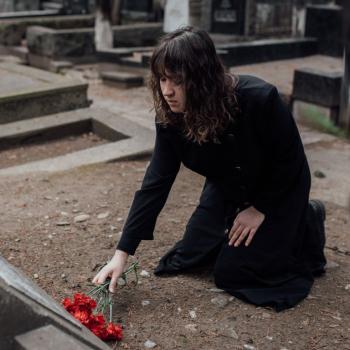Plus, in my experience with the semester system, you have this great energy at the beginning, coast through the middle months, and at the end, explode with that last bit of effort to make sure you get that "A." Our approach is accelerated and definitely intense, but its shortness helps with the natural tendency of "dropping off," for sure.
In addition to the various degree tracks you would expect from a university that focuses so closely on media—Production, Screenwriting, Animation & Gaming, even "The New Evangelization—you also have a "General Education" component that covers "the Catholic core, humanities and the natural sciences." Why does John Paul the Great make these sorts of classes such an integral (even required) part of your students' education?
I like to say that you can't tell great stories without being exposed to and understanding great stories. And you can't make films that reflect the truth without really understanding the truth—exploring what makes it true particularly in comparison to other modern philosophies that don't hold up under scrutiny, for example. By combining the media pieces with some humanities, philosophy, and theology courses, I think you get a great sense of what is necessary to come up with stories and film that manifest the truth, and that help to show the world why the Catholic world view has the Truth in it. And after these first few years' experience, I can say that it works really well, practically. It's a great combination.
Along these same lines, there was one "General Education" course that immediately caught my eye: Humanities 302—Culture Making. Do you find that your students approach this culture making as a specific and primary goal? Or does it grow organically out of the theological, moral, and artistic components of their education?
I think that we're pushing for the "organic" approach in the more idealistic, abstract realm, but in practice, it ends up being pretty close to a 50-50 percent split. We have some students who feel called to evangelize within their own church, and who come to John Paul the Great for the theological and technical skills to help parishes and parochial schools throughout the country broaden and deepen their outreach. We have kids who graduate and go on to work for Catholic Answers, or move in that direction. And there are some who move to LA and try to find their spot in The Industry. So I think the program's designed to produce subtler filmmakers, not "in-your-face Catholic" movies.
I feel like we need to be making stuff that everyone will watch. If we're only making stuff that Catholics and Christians will watch, then we're not going to impact the culture. That's just preaching to the choir. Now there's definitely a place for preaching to the choir, and goodness knows the choir needs preaching. But that's not the way we'll change culture. And our focus—our whole mission, really—is to try and produce graduates who will reach out and impact our damaged culture for the good.
In John Paul II's 2004 ad limina address that you quote in your material, the Pope references Ex Corde Ecclesia in saying that "As communities committed to the pursuit of truth and the establishment of a living synthesis of faith and reason, these institutions should be at the forefront of the Church's dialogue with culture, for 'a faith which remains on the margins of culture would be a faith unfaithful to the fullness of what the word of God manifests and reveals, a truncated faith, and even worse, a faith in the process of self-destruction" (Ex Corde Ecclesiae, 44).'" The call to avoid the sidelines is a key part of his message, but how do you respond to critics concerned that interaction with certain aspects of our media-fueled culture—by which they often mean film or television—will irreparably damage us even as we try to reform them? And how are John Paul the Great's students and graduates going about this "dialogue with our culture"?
I could talk for hours on this topic; honestly, sometimes my response depends on my mood. But the first thing I would say is: running away from it is not the answer. Now, we have to be careful about exactly what we're talking about here—what I'll let my kids watch on television, for example, as opposed to what sort of things I'm willing to expose myself to so that I can engage them, which has to come from an informed decision.
But one of the examples I will often use is the funding of crisis pregnancy resource centers, centers that reach out to women considering abortion. Obviously, I think those are great things, and we need to fund them. My argument, though, is that we can keep putting money toward this each year, yet there will always be the same number of women that need help. If we want to think long-term, we have to find out a way to impact the culture itself, so that women in this situation won't even consider abortion.





